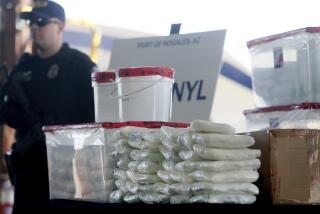Fighting the ‘Attack on All’ Alone
- Share via
Last September, President Bush called the war on terrorism “civilization’s fight.” However, the United States has mounted the overwhelming bulk of the outside world’s effort in Afghanistan.
Among close allies, only Britain has been substantially engaged. Even the North Atlantic Treaty Organization, which for the first time invoked its formal provision that recognizes “an attack on one is an attack on all,” has essentially watched from the sidelines.
But for the ongoing campaign, the United States will need major support from other nations. Before the Afghan phase of the war concludes, the United States should create a global anti-terrorism coordinating committee to marshal efforts on the many individual steps needed to undercut terrorism’s reach.
There has been a consensus about the search for Osama bin Laden, the elimination of the Al Qaeda network and the punishment of the Taliban regime that harbored members of it. But beyond that, there’s little agreement, not even on the definition of “terrorism with a global reach,” much less on what to do about it.
Many Europeans especially worry that the Bush administration has Iraq in its sights, and they are fearful both about the military costs and the diplomatic consequences throughout the region and with Russia.
They also argue for a primary focus on Middle East terrorism’s political support structure, which they believe to be a combination of economic and social backwardness, unreformed regimes, and--in particular--the continuing Arab-Israeli conflict.
Differences with the allies might not matter if the U.S. could continue largely to go it alone. But except for the use of military power in backward places such as Somalia and Sudan, the active support of friends and allies will now become critical, especially to trammel the ability of terrorists to operate around the world.
From the beginning, Bush understood this: “We will ask, and we will need, the help of police forces, intelligence services and banking systems around the world.”
Many countries responded, including those in the European Union, which committed its members to act in areas of transport security, police and judicial cooperation, denial of financing of terrorism, border controls and export controls related to nonproliferation.
Under U.S. leadership, a good deal has been achieved, but support has been far from uniform or consistent.
Ideally, we need a systematic means whereby the U.S. and its key allies can agree on an overall political strategy for the war on terrorism: definitions, sources and quality of threats, means for opposing them and the contributions to be made by different countries under different circumstances--what Secretary of Defense Donald Rumsfeld has called “multiple coalitions.”
Realistically, however, differences of viewpoint will make reaching such an agreement difficult if not impossible. That is why another approach is needed, and is likely to be more successful.
What we need is an agreement, a process and a bureaucracy to coordinate efforts in intelligence, finance, police, extradition, border controls and other bread-and-butter matters of stifling the capacity of terrorists to act.
There is useful precedent. During the Cold War, the NATO allies saw the need to keep the Soviet Union and its allies from gaining access to sensitive exports that could be diverted to military uses, but each nation had its own criteria and procedures.
Thus, from 1950 to 1994, 17 allied countries, including Japan and Australia, banded together in a Coordinating Committee for Multilateral Export Security Controls, or COCOM, to set the necessary rules.
Operating out of public view, by and large it worked, mainly because the group took the politics out of each individual decision, created a bureaucracy to apply the rules and made the whole process routine.
Today, we need a COCOM for anti-terrorism.
This would not replace efforts by individual institutions but would help ensure that they all work together and are consistent in their judgments and actions. The anti-terrorism COCOM should begin with U.S.-EU cooperation and then be extended, progressively, to other countries.
With such a structure, governments would not have to analyze in advance the precise nature of each terrorist movement and its purposes. They would not have to be faced continually with making difficult political decisions or have to decide how much leadership and control to cede to the U.S.
This anti-terrorism COCOM should be created now, before the first phase of the war on terrorism winds down and it becomes harder to mobilize support among allies that do not share all of the U.S. perspective on global terrorism. It could become a core feature of the long-term struggle to outlaw terrorism.
*
Robert E. Hunter, a senior advisor at the Rand Corp., was U.S. ambassador to NATO from 1993 to 1998.
More to Read
Sign up for Essential California
The most important California stories and recommendations in your inbox every morning.
You may occasionally receive promotional content from the Los Angeles Times.










